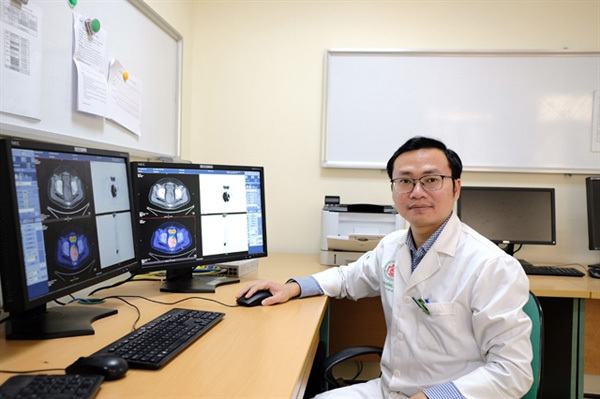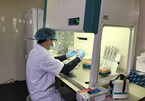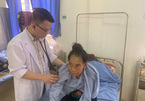Doctor Mai Hong Son, who works at the 108 Military Central Hospital in Hanoi, did not choose nuclear medicine in the first place yet 10 years of hard work and diligent learning have turned him into an award-winning expert and researcher in the field.
 |
| Doctor Mai Hong Son. — VNA/VNS Photo |
The 37-year-old studied general health major at a university in Ukraine before returning to Vietnam in 2010. Since then he has worked at the Department of Nuclear Medicine of the hospital which is among the health facilities with the most advanced nuclear medicine technologies in the country.
“Nuclear medicine was new to young doctors like me at the time, I chose this speciality because I believed in it and for me, new things can bring about success,” Son said.
Nuclear medicine involves the use of radioactive materials in imaging, diagnosis and treatment of some diseases.
His first days were the toughest as he lacked technical knowledge of this field. It also required learners to have English skills to study English materials, conduct research as well as operate imported technologies and equipment.
Despite the challenges, Son spent two years to learn specialised English and joined various training and workshops in countries including Australia, Japan, Singapore and South Korea.
He can now conduct the two most advanced scanning techniques in Vietnamese nuclear medicine. They include PET/CT (Positron Emission Tomography/ Computed Tomography) and SPECT/CT (Single-photon-emission computed tomography) scans, which are used for diagnosing cancers, neurological, cardiovascular and endocrine diseases.
Son and his colleagues are working on theranostics, a nuclear medicine approach that can help to improve the quality of diagnosis and treatment of diseases, especially prostate tumours and neuroendocrine cancer.
They have also used Yttrium-90 microsphere radioembolisation for the treatment of some 100 patients with primary liver cancer. This treatment technique is among a series of medical works that have won Ho Chi Minh prize, a national award given for a contribution to the development of the national economy, science, technology, culture or arts.
Son has conducted nearly 20 scientific papers and several other research projects at the national level.
Among them, a study evaluating the value of 18F-FDG PET/CT (18F-fluorodeoxyglucose Positron Emission Tomography/Computed Tomography) protocol in detecting recurrence in post-surgical cancer patients was published by the Asia Oceania Journal of Nuclear Medicine and Biology.
This type of scan has emerged as a powerful imaging tool for the detection of various cancers thanks to the advantages of combining PET and CT.
One of the findings of the study, co-authored with his colleagues and under the support of the Ministry of Science and Technology, is that the dedicated head and neck 18F-FDG PET/CT protocol was useful for the detection and localisation of recurrent and/or metastatic lesions in surveyed patients. This study won first prize at a medical competition in Hanoi.
Son is also very active in international co-operation activities and is the main lecturer of the PET/CT training module under a co-operation framework with South Korea’s Seoul University. He also participates in technical projects of the International Atomic Energy Agency and 108 Military Central Hospital.
The doctor has also won various certificates and awards from the Ministry of National Defence and the hospital for his accomplishments.
Doctors who are passionate and willing to learn new knowledge and technology like Son are shaping the future of nuclear medicine in Vietnam.
The country has increasingly applied radiation and radioisotope in the health sector over the past few years.
The application of whole-body FDG-PET for cancer screening, I-131 therapy for Basedow’ disease and Yttrium-90 microsphere radioembolisation for liver cancer are among the advanced technologies and techniques conducted in Vietnam’s big hospitals like Bach Mai Hospitals and 108 Hospital.
“It is one of my desires that Vietnam will be able to catch up with the world in terms of nuclear medicine, making this an effective treatment method for Vietnamese patients,” he said. VNS

Doctor dedicates life to cancer patients
Dao Van Tu’s career in the medical sector is no coincidence. It stems from his childhood.

Young volunteer doctors make changes in poor areas’ health care
Young doctors who volunteer to work at district-level health facilities in provinces across the country have made significant changes to the public health care sector.